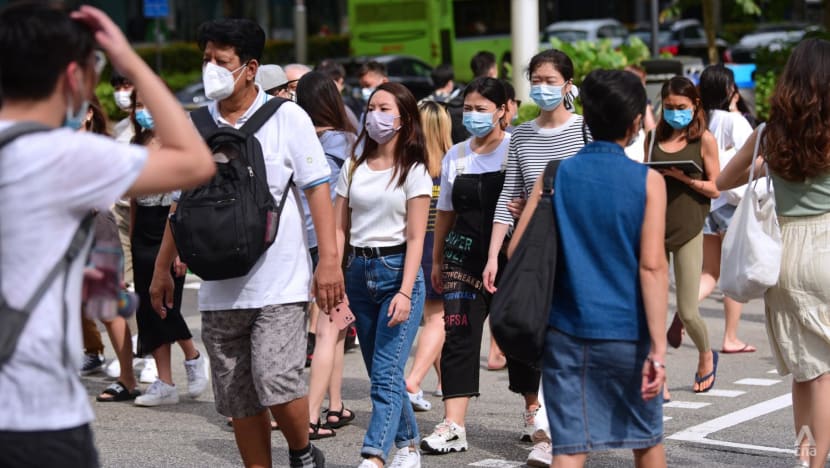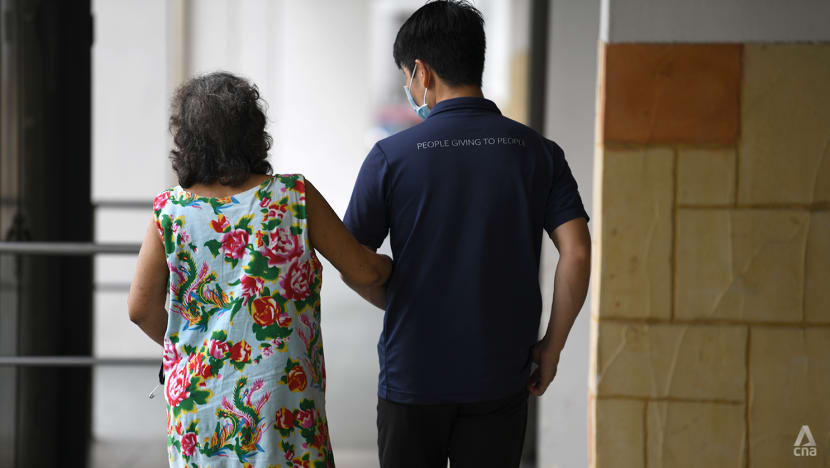Commentary: Why is this inflation so hard to control?
NUS Business School’s Sumit Agarwal and NTU’s Chua Yeow Hwee unpack what’s different about inflation in Singapore this time.

People wearing protective face masks in Orchard in Singapore on Jan 5, 2022. (Photo: Gaya Chandramohan/CNA)
SINGAPORE: There have been growing concerns about the increase in prices in Singapore.
On a year-on-year basis, Singapore’s headline inflation increased to 4 per cent in December 2021 - a near nine-year high.
This has had a huge impact on household budgets. From higher utility bills to higher prices of coffee in the coffeeshops, Singaporeans are now paying more and saving less.
Singapore’s policymakers have responded in a big way. In January 2022, the Monetary Authority of Singapore (MAS) appreciated the currency, the second tightening move in three months.
In December 2021, the Singapore Government introduced new property cooling measures to reduce the demand for private housing.
INFLATION DRIVEN BY BIG STIMULUS PACKAGES
The inflation experienced by Singapore is a global phenomenon. Prices are rising all over the world. In the United States, the Consumer Price Index increased by 7 per cent in December 2021 on a year-on-year basis. In Europe, the inflation rate rose to 5 per cent during the same time.
Most of this global inflation can be attributed to the recent expansionary fiscal and monetary policies brought about by governments and central banks worldwide.
In response to the pandemic, the US federal government allocated US$4.5 trillion in stimulus spending. Many countries similar embarked on an unprecedented scale in fiscal spending to combat the fallout of the global pandemic.

Here in Singapore, the Government committed close to S$100 billion through five Budgets in financial year 2020, culminating in its largest budget deficit since independence, with some relief set aside in 2021 to tide businesses and workers over the Delta wave.
Moreover, monetary policy was highly accommodative worldwide. Interest rates were kept nearly zero or negative in many countries (such as Switzerland and Denmark). Central banks embarked on quantitative easing as they purchased huge amounts of debt securities to prevent deep recessions.
Consequently, households and firms were incentivised to borrow freely and invest in assets globally. As Singapore is a world-interest rate taker that chooses to use exchange rate as the target of monetary policy, the interest rate in Singapore has been kept extremely low.
With so much money and liquidity flowing worldwide, investors are searching aggressively for good yields and income globally. This has led to huge capital inflows in many countries. As a major regional asset management hub, Singapore experienced an increase in capital and investment. Singapore attracted S$11.8 billion in fixed asset investments in 2021 and S$17.2 billion in 2020 at a 12-year high.
It is hence no surprise that real and financial assets such as property and equities in Singapore have seen a surge in demand by both local and foreign investors, and consequently, an increase in prices.
In 2021, Singapore’s private home prices increased by 10.6 per cent and HDB resale prices increased by 12.7 per cent. The Straits Times Index (STI) enjoyed a total return of 13.6 percent.
Sales of shophouses also rose to an all-time high of S$1.9 billion, with freehold shophouses seeing a rise in the average unit price by 19.6 per cent year-on-year. Through their impact on rents, this will have a domino effect on other aspects of the economy.
Unlike previous episodes where housing prices spiked like in 2013 and 2018, Singapore is not alone this time. Many countries, such as the United States, United Kingdom and South Korea have similarly experienced an increase in home prices by more than 10 per cent in 2021.
Consequently, recent measures meant to cool the property market such as having higher additional buyer’s stamp duties on subsequent property after the first, as well as tighter limits on loans might therefore be limited in their effect. Demand for Singapore’s houses will continue to rise if property continues to be seen as a stable, appreciating asset, relative to other countries.
Inflation has been high chiefly because of the unprecedented stimulus from fiscal and monetary policies worldwide. Only with a somewhat synchronised tightening of such policies by governments and central banks globally, will we see a slowdown in asset price inflation.
SUPPLY BOTTLENECKS
Another key difference about the current inflation is how they are also driven by supply bottlenecks due to the unprecedented pandemic curbs as factories were closed and workers were unable to work.
These shutdowns led to a shortfall in raw materials, impacting other related industries. For instance, semiconductor shortages have hindered the production of automobiles, driving up prices.
Furthermore, freight rates have increased by more than 10 times due to port disruptions and a lack of shipping containers.
These have led to an increase in cost of production in Singapore for firms, causing firms to raise their prices to protect their profit margins or go out of business.
To combat import inflation, MAS has appreciated the currency. While an appreciation in the currency could potentially reduce the costs of imports in domestic currency, it all depends on the exchange rate passthrough.
This time, due to scarcity, firms that possess the raw materials might not reduce the price in Singapore dollar, especially when they have high market power.
Furthermore, imports might not be available as other countries restrict them for their own domestic use.
Amid inflation and rising costs of living, is 2022 the best time to raise GST? Tax experts debate the trade-offs on CNA's Heart of the Matter podcast:
INFLATION EXPECTATIONS
Finally, inflation expectations also have a role to play. Inflation expectations are the rate in which households and firms expect prices to increase in the future.
They affect how households and firms respond. Higher inflation expectations will result in higher actual inflation rate as workers ask for higher wages and firms increase their prices in respond to their expectations.
One important driver of inflation expectations is related to personal experiences and shopping behaviours of households.
In our recent research study, Inflation Expectations and the Upgrading Channel, we find that when households are exposed to better quality products, they report higher inflation expectations.
This suggest that changes in consumption patterns by consumers due to the coronavirus pandemic have a direct impact on their inflation expectations.
As more people stay at home, more are shopping online and using food delivery. Households are now more conscious of their personal well-being and open to forking out more money to purchase items that they did not buy previously. This includes necessities like face masks and hand sanitisers.
But they also end up purchasing the latest electronics and ergonomic chairs to work more comfortably from home. They expect inflation to cost them more when their baskets of goods have changed and expanded.
With higher inflation expectations, managing inflation will be even more challenging in an environment with a large amount of cash and a small supply of goods.
Hence, inflation this time will be harder to control. Many will be watching what plans the Government has to fight off inflation at Budget 2022.
Sumit Agarwal is the Low Tuck Kwong Distinguished Professor of Finance, Economics and Real Estate at the National University of Singapore Business School, and the managing director of the Sustainable and Green Finance Institute at NUS. He is also the co-author of Kiasunomics and Kiasunomics 2.
Chua Yeow Hwee is a Research Fellow at the Nanyang Technological University and a Visiting Postdoctoral Scholar at the Stanford Graduate School of Business. He is also the honorary assistant secretary of the Economics Society of Singapore.
The opinions expressed are those of the writers and do not represent the views and opinions of the institutions named.


























